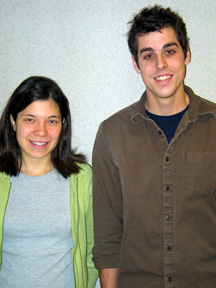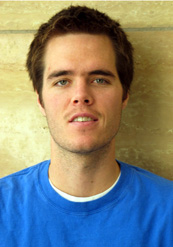 |
Abby Cheloha and James Clements. |
While each medical team will engage different cultural issues and patient concerns, the overseas teams bring their own medical supplies and all team members must pay their own travel, food and lodging expenses. So, not only is the medical mission a sacrifice of a cherished break from school, it also represents an out-of-pocket expense for most of the volunteers.
“Everybody thinks that med students are rolling in money,” said James Clements, third-year medical student and co-team leader with Abby Cheloha for the second Jamaica mission. “Actually, what we’re rolling in is debt. But the SAGH missions are a great opportunity to really test our medical knowledge and serve people badly in need of primary health care.
‘The clinic in Falmouth, Jamaica, for example, is only open when a volunteer medical team arrives and opens it up. Every instrument, bandage and medication we dispense has to be brought with us. There’s nothing there we don’t bring ourselves. That’s why financial donations and contributions of supplies are so important.”
Originally, there was only one mission to Jamaica — Cheloha and Clements went last year – but now there will be a second mission for more advanced medical students.
 |
Nick Barber |
All donations of goods and medications must be in SAGH’s possession by mid-January because of advance packaging and customs requirements. But cash contributions will be accepted through February because any additional funds will be used to defray the out-of-pocket expenses of each medical team member. The first Jamaica mission, as well as Nicaragua and Native American missions, will be March 13-20. The second Jamaica mission and Guatemala mission will be March 27 through April 3.
The medical supplies needed by mission teams include antibiotics, asthma inhalers, antihistamine elixirs for kids, steroid/hydrocortisone creams, fungal creams, silvadene burn cream, oral diabetes and hypertension medications, bandages, over-the-counter vitamins, aspirin, ibuprofen, and even small balls to give to children at vaccination stations. The expiration date should be on all medications and not expire until at least May 2005.
In addition, the mission teams request latex gloves, dental instruments, pap smear equipment, nebulizers and books on infectious diseases, pediatrics, family medicine, obstetrics, dermatology and neonatology.
Third-year medical student Nick Barber is a co-team leader with Isaac Hotz, a second-year medical student, for the Nicaragua mission. Barber went to Nicaragua in 2004 and also did a one-month clinical internship in Ecuador last summer.
“It is really important for students to learn how to serve high-need patients,” Barber said. “The medical mission also can help shape the way you want your practice to look like in the future. I really appreciated the hands on, spontaneous – often thrilling – opportunities to learn new procedures and help a large number of people.
“The donations we receive are deeply appreciated because without them, we cannot have these missions. The communities we serve – men, women and children – would lose out and UNMC’s students would lose outstanding opportunities to learn, from a diversity of cultures, what constitutes good medical care.”
For more information about how to contribute medical supplies or financial donations, contact Sara Pirtle, coordinator of International Studies and Programs at UNMC, at 402-559-2924 or by e-mail at sepirtle@unmc.edu.